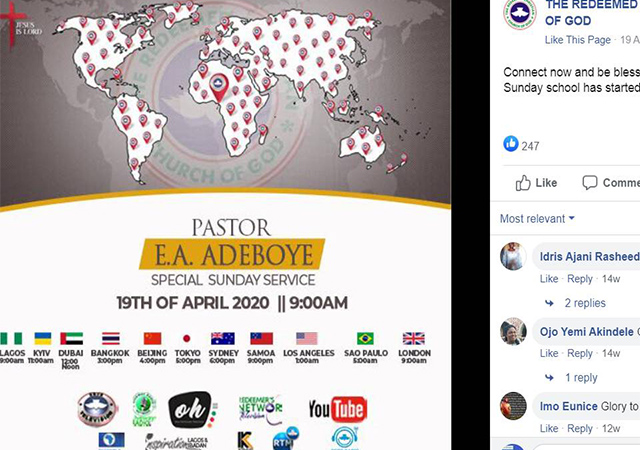 The Redeemed Christian Church of God on Facebook.
The Redeemed Christian Church of God on Facebook.
[This is an excerpt from an article appearing in the current edition of The Round Table: The Commonwealth Journal of International Affairs. Opinion articles do no reflect the position of the Round Table Editorial Board.]
With few exceptions, most churches which have shifted to online services have seen an increase in church ‘attendance’, often from outside their local regions, suggesting that religion offers hope in times of adversity. However, it also raises questions about access for different sectors of communities. Wesley Methodist Church, the largest and oldest Methodist congregation in Singapore, has proactively helped senior members overcome technological barriers by calling them individually to help them access the church’s online services. In other regions, where there is a sharper urban-rural divide, some churches have considered other alternatives, from drive-by blessings of palm fronds on Palm Sunday in the Philippines to smaller house fellowships without government restrictions in rural Kenya. Shifts to online modes of worship result in shifts in understanding of the church’s role in broader society.
In a number of African countries, churches and charities support over 50% of biomedicine. They are vital, trusted providers of care and are already familiar with managing infectious diseases, like Ebola, TB, malaria, measles and HIV. Church medical facilities provide supportive networks, medical treatment, and prayers for healing. Yet the mix of faith and health does not always lead to positive disease control. Disease outbreaks have caused stigma, accusations of witchcraft and the adoption of rituals which present appealing alternatives to physical distancing, closure of community organisations and alterations to rites of passage. Some church leaders have flouted public health measures, but the majority firmly support government advice. In Uganda, for example, Dennis Kilama, Senior Pastor of Lugogo Baptist Church, Kampala, applies public health advice to his sermons and blogs. In Nigeria, the public health department of the Redeemed Christian Church of God (RCCG) complemented the Nigeria’s government initiatives by making substantial donations of money and hand sanitisers, surgical face masks and gloves to hospitals. RCCG parishes have provided food throughout the country to feed those whose livelihoods are affected. On its media channels, the RCCG broadcast public health messages and educational programmes for children whose schools had been closed. In Kenya, President Uhuru Kenyatta, a member of the Catholic church, led the nation in a day of prayer against the pandemic on 21 March 2020. In doing so, he acknowledged a wide-spread belief that the causes of the disease and its ultimate remedy lie beyond human control. The scientific and the spiritual are bound together in many frontline responses in Africa.
Online worship services and front-line medical and public health services are just two ways in which Churches and charities are responding to the pandemic in 2020. They show that, as has been the case for much of Christian history, Christian practice is both shaped by disease and shapes the response to it.
Emma Wild-Wood and Alexander Chow, School of Divinity, University of Edinburgh.
Related articles:
Life in the time of corona – Round Table, May 2020
Learning from COVID-19: Commonwealth perspectives – Round Table, July 2020



